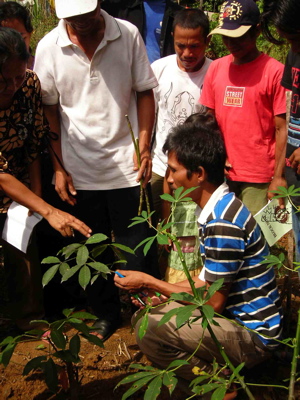The Dayak people of Belantikan have lived with the forest as subsistence farmers for centuries and still it thrives. They carve out their small field (ladang) in the forest for cultivation and occasionally venture into the interior to hunt and gather other food to supplement their diet. However, some of their other practices for example, traditional slash and burn agriculture, unnecessarily destroy patches of forest annually. As the amount of available primary forest shrinks year on year due to the incursions of logging, palm oil and mining, it’s more and more important to ensure that the agricultural methods of the people living in the forest are as sustainable as possible. Therefore, Yayorin is working to introduce new practices for the benefit of the forest and the people, showing the villagers how they can continue to use the same field year on year. Introducing the cultivation of rubber, which takes five years to mature, means that the villagers cannot simply burn the field after they have harvested their vegetables, and this benefits the forest. The production of rubber is also beneficial to the people as it provides them with a long-term continuous income source. The vast majority of farmers across the three villages have already started to cultivate rubber, significantly reducing the use of slash and burn.
Rubber Training - Photo: Yayorin ("We do not have full-scale rubber cultivation. What we do is agroforestry with rubber as main plants. In the agroforestry system, we mix different plants in one area like vegetables, fruit trees, gaharu and rubber. This way, the community can enjoy the short and long harvest" - Togu Simorangkir, Chairman of Yayorin).
Yayorin’s community development and empowerment work is also helping the villagers to recognise that the long-term value of the forest is more precious than the short-term rewards that could be gained by surrendering their traditional land to those who would destroy it in the interests of quick profit. The benefit of this strand of Yayorin’s work was shown in June 2006, when the villagers of Kahingai chose to reject an astounding offer of 30 million rupiah per family to sell their land to a palm oil company.



